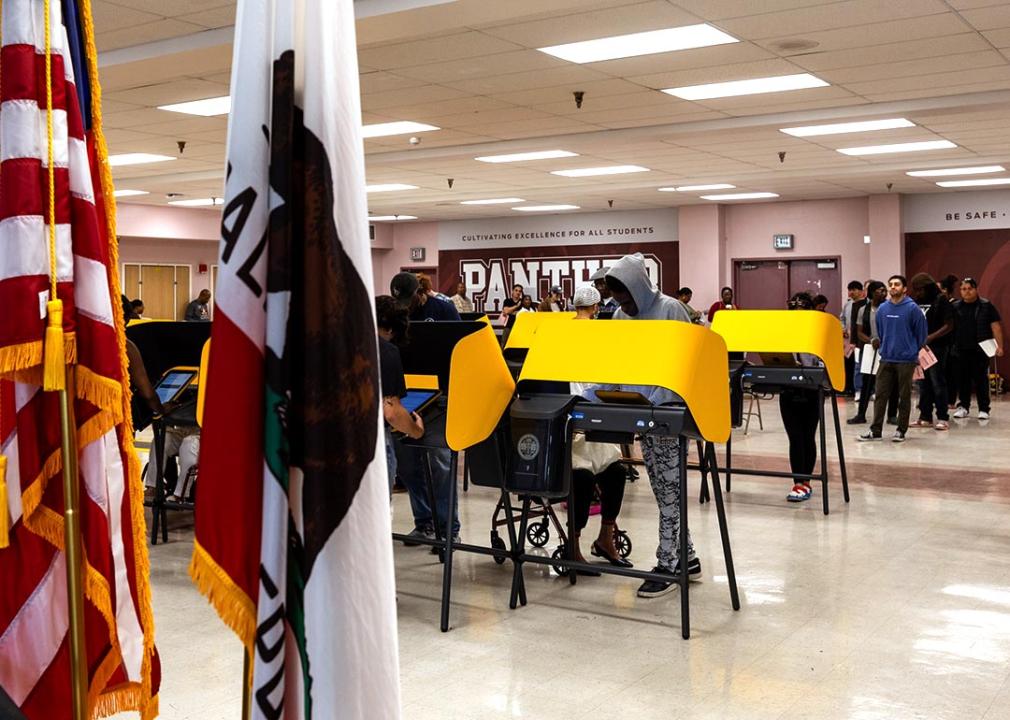Voters in 12 states approved seven and defeated five state education ballot measures on Nov. 5

Qian Weizhong // VCG via Getty Images
Voters in 12 states approved seven and defeated five state education ballot measures on Nov. 5
People cast their ballots for the 2024 United States Presidential Election at a polling station on November 5, 2024 in Los Angeles, California.
Voters decided on 12 education-related state ballot measures—the most in 18 years— on the Nov. 5, 2024, general election. Ballotpedia shares are some highlights:
- Two ballot measures regarding school choice programs and one to repeal a school choice program were defeated.
- One ballot measure to make school board elections partisan was defeated.
- One measure to grant a local school board the authority to manage, sell, or lease land in their district was approved.
Measures were on the ballot in Alabama, Arkansas, California, Colorado, Florida, Kentucky, Massachusetts, Nebraska, Nevada, New Mexico, Rhode Island, and Utah. The measures regarded school choice programs and non-public education, standardized testing, school board elections, school governance, and funding. Here are the results.
School choice:
The three ballot measures regarding school choice programs, which include policies that provide families with taxpayer funding for private education or homeschooling, were all defeated:
- Colorado Amendment 80 would’ve provided that “each K-12 child has the right to school choice.” The measure was defeated, with 51% of voters against it.
- Kentucky Constitutional Amendment 2 would’ve allowed the state to provide funding for non-public education. The measure was defeated, with 65% of voters voting against it.
- Nebraska Referendum 435 would’ve repealed the law providing for an education scholarship program for students to attend accredited private schools. The measure was defeated, with 57% of voters voting against it.
Tests:
Massachusetts Question 2, concerning standardized testing requirements, was approved by 59% of voters. It eliminates the requirement that students must pass a standards-based exam to graduate high school.
Elections:
Florida Amendment 1, which would’ve changed school board elections from nonpartisan to partisan starting in 2026, was defeated. It needed 60% approval from voters but received 55%.
Funding:
Five ballot measures related to school funds or funding were all approved:
- Arkansas Issue 1 allowed state lottery proceeds to fund scholarships and grants for vocational-technical schools and technical institutes. The measure was approved with 90% of voters approving it.
- California Proposition 2, issued $10 billion in bonds to fund construction and modernization of public education facilities. It was approved by voters with a 57% majority.
- New Mexico Bond Question 3, issued $230.26 million in bonds to fund capital improvement projects for higher education institutions, special public schools, and tribal schools. It was approved by voters with a 65% majority.
- Rhode Island Question 2, issued $160.5 million in bonds for improvements to higher education facilities. It was approved by voters with a 60% majority.
- Utah Amendment B raised the annual distribution limit from the State School Fund for public education from 4% to 5%. It was approved by voters with a 70% majority.
Governance:
Two ballot measures related to school district or college governance appeared on the ballot in Alabama and Nevada:
- Alabama Amendment 1, which was approved by a 74% majority, authorized the Franklin County Board of Education to manage, sell, or lease lands and natural resources within the Franklin County School System.
- Nevada Question 1, which was defeated by a 54% majority, would’ve removed the constitutional status of the Nevada Board of Regents, which oversees state universities. This would’ve allowed the state legislature to change the governing structure of NV universities through state statutes.
![]()
This story was produced by Ballotpedia and reviewed and distributed by Stacker.